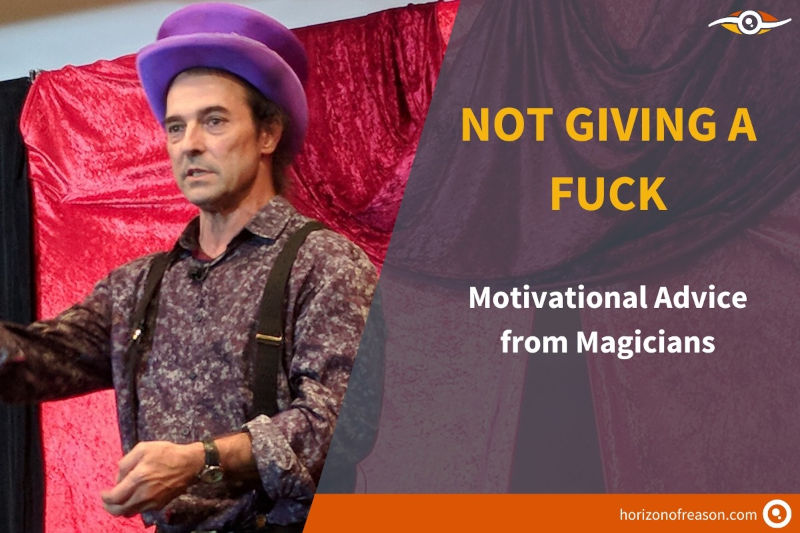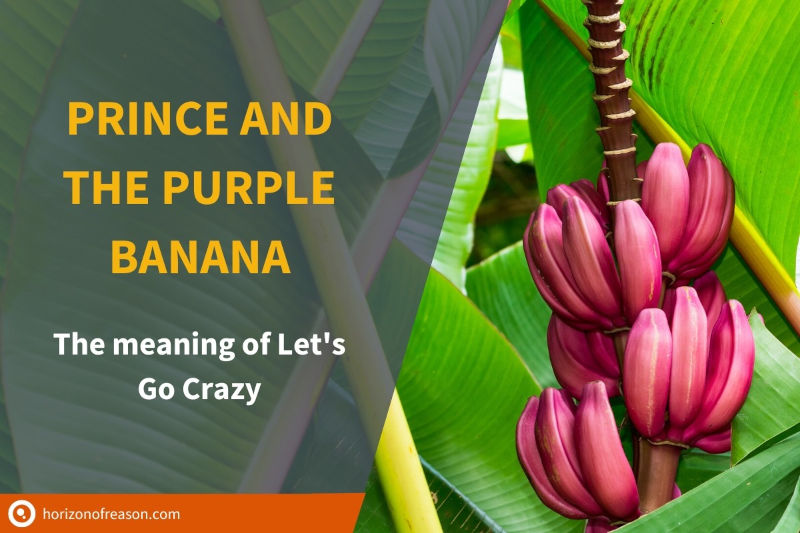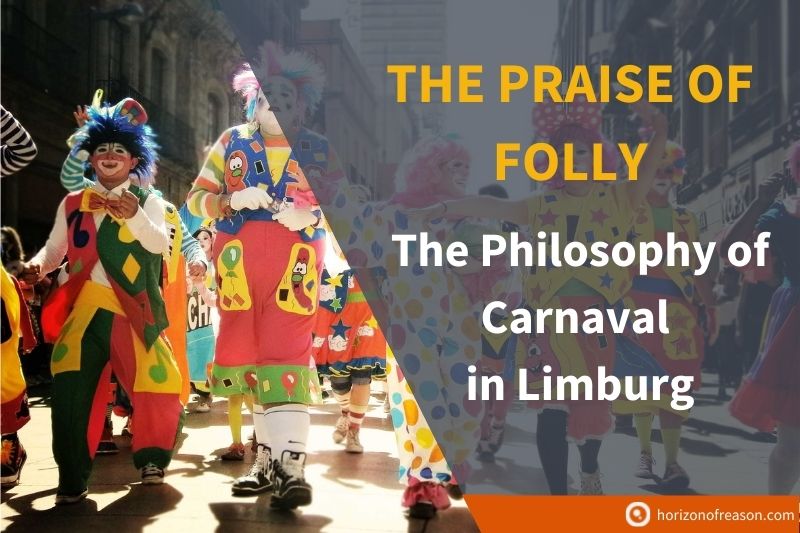
Life Lessons from Magicians: The Magic of Not Giving a Fuck

Peter Prevos |
1431 words | 7 minutes
Share this content
Last October, I visited the 2017 New Zealand Magic Convention in Wellington. It was an inspiring long weekend filled with fantastic magic in one of my favourite cities. Travelling from Melbourne to the land of the long white cloud, I read The Subtle Art of Not Giving a Fuck by Mark Manson. The central thesis of his book is that we care too much about things that are not important. Because there are only so many 'fucks' you can give, Manson believes that caring about the wrong things is a waste of energy.
Magic conventions are usually a place to share the secrets of conjuring. This convention proved to be different as some of the issues that magicians discussed went beyond merely sharing methods to deceive people. Some of the magicians shared their view on life, which closely related to Manson's thesis. This essay reflects philosophically on the Subtle Art of Not Giving a Fuck and shows how professional magicians apply this wisdom to become better performers.
The Subtle Art of Not Giving a Fuck
While the title of Manson's book is somewhat blunt and controversial in some circles, his message is more subtle than the title suggests. Firstly, Manson doesn't advocate that you should be indifferent to what happens in your life, but that you should be comfortable with being different from the norm. Society projects a powerful social conformity force field and that compels us to meet social standards. While confirming with society is essential, the people who resist this force are the ones who move civilisation forward.
Not giving a fuck also doesn't imply that you can be a psychopath and do whatever you feel like without worrying about consequences. It is about finding out what is important to you and give a fuck about this instead of worrying about conformity for the sake of fitting in.
Another vital part of not giving a fuck is the importance of self-sacrifice. Manson writes that desire for merely positive experiences is itself a negative experience. Our desires have no limits and can never be fully satisfied. He harkens back to Nietzsche's Twilight of the Idols: 'That which does not kill me, makes me stronger".
Paradoxically, undergoing a negative experience is a positive experience. The main lesson in Manson's book is that when you don't give a fuck about the pain required to attain our goals, you will most likely achieve them. Manson firmly positions himself against the self-help industry. The authors of who advocate that merely visualising your success, and wanting something badly enough is sufficient.
His book is not the only one that advocates not giving a fuck. A year before Manson, Sarah Knight published The Life-Changing Magic of Not Giving a F**k. Note how Sarah is less daring as she uses two asterisks. In her TEDx talk in Coconut Grove, she talks about de-cluttering not only your home but also yourself.
A year before Sarah, Stephen Parato, wrote The Art of Not Giving a Fuck. He genuinely did not care because he did not use any asterisks at all. As Stephen put it: "if you are offended … you probably need this more than you think".
These books are somewhat crude, but entertaining account of what several philosophical traditions have claimed for centuries. Ancient Greek philosophers, Roman stoics and strands of Eastern philosophy promoted detachment as a way towards a better life. The next section reflects philosophically on the folk wisdom of not giving a fuck.
The Magic of Not Giving a Fuck
Magic is a quaint performance art that revolves around secrecy. Magicians gather at conventions to share and sell their secrets to their brethren (magic is still a very male-dominated craft). A typical conference consists of a market where magic trick dealers sell the latest paraphernalia and performances and respected magicians perform and give lectures. Most lecturers perform and explain some of their magic tricks to the eager audience. At the 2017 New Zealand convention, the lecturers also shared some philosophical insights about their craft which relate directly to the subtle art of not giving a fuck.
Magicians are an interesting case study for detachment because they exemplify the subtle art, not giving a fuck. Becoming a good magician requires thick skin. The only way to learn magic is to perform for other people as often as you can. Because magic is so hard to do, every beginning magician and many experienced ones are terrible. Look at YouTube to convince yourself of this statement.
Possibly some of the most despised words in the English language are "pick a card, any card". Magic is hard to perform because, when not performed very well, it challenges the audience's intelligence in a way no other performance art does. As Jerry Seinfeld put it poignantly: "Here's a quarter, now it's gone. You're a jerk."
Magicians love their craft more than the petty opinions of their audiences, and good magicians improve their skills to the point where they perform artful magic. The New Zealand Magic Convention hosted several world-class magicians, each of which lectured on their views on performing magic. Interestingly, almost all of them spoke about how detachment improved their performances.
Rob Zabrekcy
American musician, actor and magician Rob Zabrecky delivered an inspiring lecture in which he focused on magic as a form of theatre. Rob's performances are beautiful examples of creative magic. His main advice to his fellow magicians was to "take emotional risks". His take on performing magic is strongly influenced by his acting, where taking emotional risks is necessary to be convincing.
Take emotional risks
Most magic tricks are, in essence, boring because they follow a mechanical process without an emotional hook. You pick a random card, I find it; why bother? I learned about this concept when performing magic shows for children. The more I clowned around without giving a fuck, the more I detached myself from my usual public persona, the stronger the children reacted. Taking emotional risks is as important in the performing arts as it is in ordinary life.
Dan Sylvester
One magician who exemplifies not caring about conventional approaches is Dan Sylvester. His character Sylvester the Jester stretches the boundaries of traditional magic shows as he recreates a live version of the Loony Toons universe. In his show, anvils appear, sparks shot from his ears, his eyes pop out of his skull, recreating the crazy world of cartoons. Dan was asked about the target market for his show. His answer was short and sharp: "I don't give a shit".
Don't give a shit
Traditional knowledge in marketing suggests that entrepreneurs, including entertainers, should provide services based on what the market needs and wants. Most marketing textbooks will tell you that you should look for customers and develop a service, rather than the other way around. While this approach might be more likely to lead you to financial success, it is unlikely to lead you to high art. Only when people don't give a shit can culture progress. Following the well-trodden path has never improved anything.
Héctor Mancha
Lastly, the brave firefighter from Madrid, Hector la Mancha told us to "be brave"; and defy the laws of tradition. La Mancha does not merely say this; he puts it in practice.
Not only is he a firefighter, which requires innate bravery, but he also flaunted the traditional conventions of stage magic and became world champion. Héctor performed a creative manipulation act at the World Championships of Magic in Italy in 2015. He did not wear the usual gentleman's attire but danced around barefoot with short sleeves and a top hat, pulling playing cards from the air. He performed a brave unusual act, and the judges rewarded Hector's defiance of the laws of traditions with the main prize.
Be brave
You can view some of the inspirational magic by Zabrecky, Sylvester and Hector in the video below.
Life lessons from magicians
The term "not giving a fuck" is slightly deceptive because it seems to suggest that nothing matters. The key to understanding this slogan is to find out what you should give a fuck about and to recognise what does not merit our attention.
Popular psychology books about not giving a fuck not only have enticing titles. These books also contain a beneficial message. In a time where our desires can be driven by external forces such as social media and marketing, finding your way in the world is a powerful message.
Perhaps you can follow the advice of some of the world's best magicians:
Take emotional risks, don't give a shit and be brave.
Share this content


